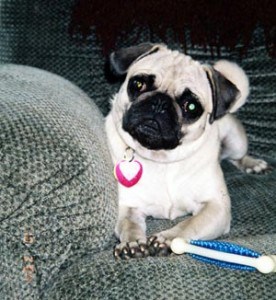Good day and welcome everyone!
This is Sharda with another Pugs newsletter!
Today we will discuss about ways to detect good Pug breeders!
When dealing with Pug breeders, there are a number of things you should consider while dealing with your breeder.
They are:
- What is his motivation for breeding?
- If he tells you he is breeding dogs only because it is lucrative,
It should make your hackles rise since reputable breeders don’t breed dogs for money but to improve the strain.
- Ask him if he has had both the parents of the pup screened for genetic health problems or not.
He should also be able to show you medical records of his Pugs to prove to you that he gives them proper care.
- Check to see if he keeps a well-ventilated, clean and odourless site.
If your pup suffers from a health problem after you take him in, your breeder is duty-bound to offer a guarantee against them. He should also offer to take back the animal if you are unable to look after him.
If he is a responsible breeder, he will not entertain prospective owners who are investing in a pup only on a whim. This is why good breeders do not advertise in newspapers or sell their puppies on the Internet but have long waiting lists and sell through personal contact with owners even before the litter is born.
Pug breeders references are some of the best ways to find out all about a particular breeder. Or ask him for references, contact Pug Clubs or other Pug organizations to see if they have any information about this breeder. Check with your vet for more advice.
Screening the breeder: If you’ve decided that a Pug is the breed for you and that it fits your family and lifestyle, that if he sheds copiously, snores and snuffles, has bad breath and scratched eyes and suffers from flatulence, it doesn’t matter but you must have him for his cute face and cheerful temperament.
Well, don’t ignore the problems they come with but be realistic in your expectations. Anyone can find you a good breeder, but only you can educate yourself on him or her before actually finding one.
Here are some self-help tips:
Whom to contact: Your local specialty breed dog club, your local all breed dog club or your local rescue dog group are good places to start with. Plus, the AKC also maintains an up to date geographical list of dog clubs of all types and for all breeds for those in the US.
Besides, The Pug Dog Club of America keeps a list of specialty breed clubs too. If you call the club, ask them if they could recommend a few breeders to you in your area.
Call the breeder: Be prepared to answer his questions about yourself and your family. Answer him freely and frankly and ask him as many questions as come to your mind.
Health checks: Ask him if he has had health checks done on the parents of your pup—perhaps an OFA x-ray on their hips, checking for hip dysplasia, CERF testing of their eyes for cataracts or other forms of inherited early blindness.
See if either parent has a recurring history of seizures or other neurological problems.
Also, see that he gives you the following health certificates for these specific problems:
CERF certificates: These certificates prove that your breeder is concerned enough about your Pug’s vision to have the sight of his parents tested. By making them undergo an eye examination, a specialist determines whether, at the time of the eye examination, the Pugs had any eye disease.
An eye specialist must conduct this not a vet, as a vet cannot perform such a specialized examination. The Canine Eye Registration Foundation (CERF) gives certificates for this.
Orthopedic Foundation for Animals (OFA): It is the breeder’s duty to have the hips of the sire and dam of your Pug X-rayed for possible hip dysplasia. Your breeder’s vet will X-ray the dogs that are then sent on to the OFA to be evaluated by three vets.
If you come across a breeder who claims never to have encountered such a problem with any of his dogs so didn’t have to resort to the OFA tests on his pups, be very cautious dealing with them.
Patella tests: A breeder’s duty also lies in having the rear kneecaps or patellae of his pups examined to check for luxation or looseness or a bad fit in the kneecap. Your breeder’s vet usually conducts this test.
Once done, his vet sends the test results to the OFA who will issue the breeder a certificate of passing patellae. This certificate must then be shown to prospective buyers. If your breeder doesn’t seem to have heard of this test, don’t deal with him.
Visit the breeder: Look around at the site where the pug puppies are being raised. By staying where they are, are they able to socialize with the family or are they rose in an isolated location
Is their home clean and odourless- Does the breeder paper-train them? Ask to see a copy of the pedigree and registration slips and any health records or other relevant information. Check if your breeder would allow you to call any of his previous buyers for references.
I hope that you learned a lot from today’s Pugs newsletter
All the best and take care
Warmly,
Sharda Baker

